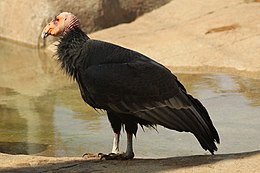Californian condor
| California condor Temporal range: 2.5–0 Ma Early – Holocene |
|
|---|---|
 |
|
| At San Diego Zoo, USA | |
| Scientific classification | |
| Kingdom: | Animalia |
| Phylum: | Chordata |
| Class: | Aves |
| Order: | Cathartiformes |
| Family: | Cathartidae |
| Genus: |
Gymnogyps Lesson, 1842 |
| Species: | G. californianus |
| Binomial name | |
|
Gymnogyps californianus (Shaw, 1797) |
|
 |
|
| Synonyms | |
|
Genus-level:
Species-level:
|
|
Genus-level:
Species-level:
The California condor (Gymnogyps californianus) is a New World vulture, the largest North American land bird. This condor became extinct in the wild in 1987 (all remaining wild individuals were captured), but the species has been reintroduced to northern Arizona and southern Utah (including the Grand Canyon area and Zion National Park), the coastal mountains of central and southern California, and northern Baja California. Although other fossil members are known, it is the only surviving member of the genus Gymnogyps. The species is listed as critically endangered by the IUCN.
The plumage is black with patches of white on the underside of the wings; the head is largely bald, with skin color ranging from gray on young birds to yellow and bright orange on breeding adults. Its huge 3.0 m (9.8 ft) wingspan is the widest of any North American bird, and its weight of up to 12 kg (26 lb) nearly equals that of the trumpeter swan, the heaviest among native North American bird species. The condor is a scavenger and eats large amounts of carrion. It is one of the world's longest-living birds, with a lifespan of up to 60 years.
Condor numbers dramatically declined in the 20th century due to poaching, lead poisoning, and habitat destruction. A conservation plan was put in place by the United States government that led to the capture of all the remaining wild condors which was completed in 1987, with a total population of 27 individuals. These surviving birds were bred at the San Diego Wild Animal Park and the Los Angeles Zoo. Numbers rose through captive breeding and, beginning in 1991, condors were reintroduced into the wild. The California condor is one of the world's rarest bird species: as of December 2015 there are 435 condors living wild or in captivity.
...
Wikipedia

